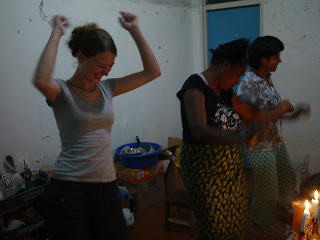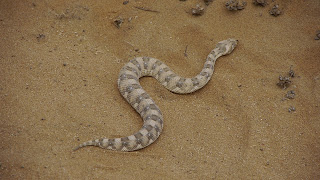When I wake up the sun is already out. It’s 6am and it’s already getting too warm inside
our tent in Chona, a small village west of Zambia's capital Lusaka. We’re having
(English!) breakfast together with our host Momo, a Japanese nurse who’s
volunteering at the local clinic, and her friend Tamaki. They just helped to
deliver two babies, one of them named after Tamaki.
As we arrive at the clinic there are already many people
waiting outside of the registration office. The “registration office” is a
small room where thousands of booklets are piled up. It’s probably the messiest
and dustiest room I’ve ever seen. Every patient gets a number when he first
visits the clinic. He has to bring his own booklet - a small exercise book. If he doesn’t have money to
buy one, they cost 10 cents in the local market, he is turned away. While Vijay is enquiring the patients name, age and
headman (which indicates the village they’re leaving in) and writing them down
on the booklets, I try to find the booklets that have already been
personalized. Sometimes the booklet is on the shelf where it should be, but
most of the time I have to go through several piles of unsorted booklets. Some
booklets just can’t be found. Then the clinic provides them with a “new”
booklet – another patients booklet from 2009 where we tear out the indicates
the doctor has written down. As soon as they are registered – we have their booklet on a
pile and bring it into the doctors office – the people queue again. After they’ve seen the doctor they queue
again in front of the pharmacy where they show their booklet, with newly indicated prescriptions, and get their
medicine. It’s impressive how patient they PATIENTs here are. Many come from
far away. They walk for several hours to get here, queue hours in the sun – all
being ill.
After helping out at the registration, I can see the new
born babies and their mothers. An 18 years-old HIV-positive woman hasn’t decided
yet what name her boy is going to get. She looks tired, but smiles when I tell
her that she has done well and has a beautiful baby boy.
Later, I give a hand
at the HIV-testing. It’s Wednesday, so
all pregnant women from the area come to get checked. One part of it is the
HIV-test. Most of the women already have
many kids, one of them – aged 29 – is awaiting her 6th…
It’s good to see that most of the womens test results are
negative today. Two husbands are tested positive though. Other tests have to
be done.
Around 1pm the clinic closes and we prepare lunch: Zambian-Japanese fusion cooked on charcoals. It's very hot now and we try not to move too much. But the buckets need to be filled with water. The tap water is only running between 11am and 4pm when the sun is strong enough to make the solar pump work. Momo's house is one of the few with taps, so people come here to fill their buckets as well as for recharging the batteries of their mobile phones . There are only two houses with electricity (thanks to solar panels) in the village. Not even the clinic has electricity!
After lunch we go to the local school. We've already spoken to the headmaster and the senior teacher Mr Moses the day before. We take a seat in their small, dark office between two classrooms and soon end up in a Math lesson of grade 9. There are more than 50 pupils in this class. Some of them with notebooks others only with their torn school uniform. While I am more focused on the teacher-pupil interaction and the teaching skills, Vijay is paying more attention to the calculations. As he politely points out the teachers errors on the blackboard, the classroom fills with laughter. Fortunately the teacher has got a good sense of humour!
Later in the afternoon we climb a rock near the village, where we get a beautiful view of the surroundings and enjoy the sunset.
After dinner Vijay and our host Momo, surprise me with wine and lots of snacks which Momo brought from the city. When Ms Kaboscha, Momos neighbour who is also working at the clinic, joins us, the birthday party is perfect!






























